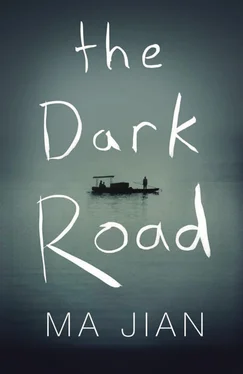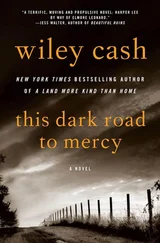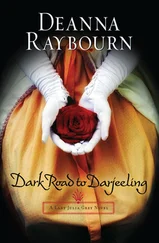‘Don’t give in to despair,’ Kongzi tells Weiwei. ‘Death is merely a turning off of the lights. Come on, have another drink. And you too, Meili.’
Meili raises her glass and looks into Weiwei’s bespectacled eyes. She assumes he’s abandoned the search, but knows that the thought that his mother’s corpse may be lying undiscovered in the river must be torturing him. She notices his filthy collar and wishes she could pull off his shirt and scrub it clean.
Kongzi lifts his eyes to the ceiling and sighs. ‘The ancient philosopher, Laozi, said: “The greatest good is like water: it gives life to the ten thousand things, but does not strive. It flows in places men reject and so is like the Tao…” But this Xi River doesn’t give life. It’s a flowing cemetery of bodies, pollution and waste…’
‘The Taoist philosophers were attempting to come up with principles to govern human conduct,’ Weiwei replies. ‘But who’s interested in principles now? When his mother passed away, the Taoist sage, Zhuangzi, beat his drum and laughed. His mother died a natural death, so he could regard it with equanimity. But my mother was driven to her death by a government that has washed its hands of the sick and the poor. I can’t help giving in to despair. Since the Tiananmen Massacre, this country has lost its conscience. Money is the only religion.’ Weiwei puts a cigarette in his mouth and lights up, but chokes at the first puff.
‘Don’t smoke if you’re not a smoker,’ Meili says, taking the cigarette from him. She sucks a puff then keeps it held between her fingers, tapping it against an empty cup when the ash becomes too long.
‘You’re right,’ Kongzi says. ‘I never dare discuss such things with my wife, but mark my words: one day the official verdict on Tiananmen will be reversed. My old teacher, Mr Zhou, is convinced of it. A toast, Weiwei: “Friends from afar meet but rarely. Let us raise our glass in joy and drown our sorrows!” Since you didn’t find your mother today, we won’t charge you anything for this trip. Come on, now. It’s not often I get to sit down with a graduate. Let’s test our wits. We’ll take turns to recite a line of ancient poetry that contains a character connected to water. Whoever slips up must drink a shot.’ At the back of the restaurant, two men covered in cement dust are drinking beer. The only light in the room is coming from the single bulb overhead and the glowing television screen. A rusty electric fan on the cashier’s desk slowly stirs the air. Mosquitoes and flies flit from the plates of food to one of the six forearms pressed on the table.
‘Fine, let’s toast the Xi River and give it a go!’ Weiwei says. He undoes the top button of his shirt, then, glancing at Meili, quickly does it up again.
‘“The white sun sinks behind the mountain as the Yellow River glides towards the sea,”’ Kongzi recites, tapping the line’s rhythm on the table.
‘“A low ray of sun spreads across the water which is emerald along one side, and red along the other,”’ Weiwei chants, rubbing the edges of his tortoiseshell glasses.
‘I said the line should contain a word with a watery connection, not the word “water” itself. You lose! Drink up!’
‘If you insist,’ Weiwei sighs, and empties the glass. ‘But next time, if I manage to replace “water” with another word, while retaining the sense, you must let me off.’
‘All right, I’ll agree to that. Ready? “The bright moon rises from the sea; at different edges of the sky, we admire the same view.”’
‘“I at the head of the Yangtze River, you at the tail, we drink—”’ The next word is “water” but Weiwei stops himself just in time and says, ‘No, make that “we mourn our loved ones who rest on the river’s bed.”’
‘A fine line,’ Kongzi says, the image striking at his heart. He pauses to wipe a tear from his eye, then continues the game. ‘“The moon follows the river’s waves for ten thousand li; in spring, its radiance overflows the banks.”’
‘“The mountain pass is hard to breach; who feels sorrow for the man who has lost his way?” Weiwei says, pushing his glasses further up his nose.
‘No water connotation!’ Kongzi shouts out, banging the table. ‘You’ve lost again!’
‘But the character “sorrow” contains the water radical on the left.’
‘You need two radicals for it to count, I’m afraid. You’ve definitely lost, brother. Drink up!’
Once the men empty the last dregs from the bottle, Meili whispers to Kongzi that they should return to the boat to sleep. Kongzi ventures out into the dark to find a toilet. Weiwei settles the bill then returns to the table and says to Meili, ‘Are you sure you’ve had enough to eat?’
‘Yes, thank you,’ she answers, staring at the fish bones on the plates, wondering, with a shudder, whether the fish they’ve just eaten once fed on the corpse of Weiwei’s mother. More flies gather on the plates and crawl over the leftovers.
‘You looked so beautiful when you were driving the boat,’ Weiwei says. ‘Kongzi is a lucky man.’ As she looks up at him, he glances out of the window, too embarrassed to meet her gaze, and they hear a loud, grating rumble outside that sounds like a truck emptying rubble onto a boat. Meili’s heart begins to thud. This is the first time that any man apart from Kongzi has told her that she’s beautiful. Not knowing what to say, she looks down again and stares at the plates and at Weiwei’s watch.
‘I’ve put you both to so much trouble today,’ Weiwei says, gripping his empty glass. ‘“Where will I be when I wake from my drunken sleep? / On the willow banks, in the dawn breeze, under a fading moon.” That would work. “Drunken” and “banks” both have watery connotations…’
‘It’s been no trouble at all. So, how many children did your mother have?’ Meili wants to tell Weiwei that with his round tortoiseshell glasses he looks just like the university professors who give lectures on television.
‘Four boys and one girl. I’m the eldest. Tell me your name again.’
‘Meili.’
‘As in “Beautiful and Pretty”? How apt.’
‘How common, you mean. Every woman in the countryside is called Meili. But my “Mei” is the dawn “Mei”. I was born in the morning.’
‘Ah, that’s different, then. “Beautiful Dawn”, or “Beautiful Beginning”. Very poetic.’
Meili thinks of her mother, and remembers her lying asleep on a chair while breastfeeding Meili’s brother, her milk tricking down his cheek. She wonders whether her grandmother is still well enough to walk about and go out into the garden. ‘When our parents are alive, we’re young,’ she says. ‘But as soon as they die, we become old.’
‘You’re right,’ Weiwei says, looking down. ‘When our parents are alive, they stand in front of us, blocking our view of death. But once they’ve gone, we find ourselves at the cliff edge. Whether we jump now or later doesn’t make much difference. The next step we take will be the end.’
‘Don’t be so negative. Perhaps your mother didn’t throw herself into the river after all. Perhaps she’ll turn up at your home one day. You only have one life: you must be kind to yourself.’
‘Yes, we’re only here once. We’re unlikely to cross paths again.’ Weiwei returns his blank gaze to the window. The only sign of the river now is the trail of light from a passing boat. The flies and mosquitoes swarming the night air are only visible once they hit the glass pane.
‘You have a long life ahead of you, a son who’s off to university…’ Meili says, glancing at the educational programme being broadcast on the television now. Moths flit around the bulb above. One of them breaks a wing, falls to the table and flutters about in distress.
Читать дальше












